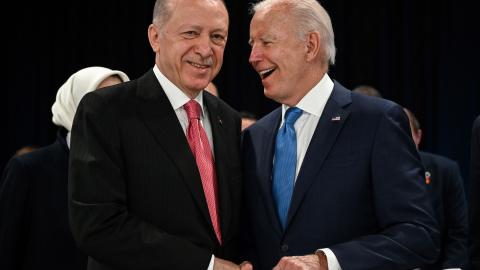Pity Kemal Kılıçdaroğlu. The Turkish opposition candidate faced an impossible challenge: running for president with American lipstick on his cheek.
Call it the kiss of Biden. In 2020, when Joe Biden was a candidate for president, he told the editorial board of the New York Times that he favored working with “elements of the Turkish leadership” to “embolden them…to take on and defeat [President Recep Tayyip] Erdoğan.”
If there is one thing Erdoğan knows, it’s how to use the hostility of foreigners for political gain. By appealing to the profound patriotism of the Turkish electorate, he turned the kiss that voters perceived President Biden to be giving to Kılıçdaroğlu into a kiss of death. “Biden gave the order to topple [me],” Erdoğan said last Saturday, the day before the election. “The ballots tomorrow will also give an answer to Biden,” he continued.
A series of blunders by Kılıçdaroğlu helped Erdoğan further build the case that his opponent was Biden’s beloved. First among these was the tacit alliance that Kılıçdaroğlu made with the Peoples’ Democratic Party (HDP), a Kurdish party which mainstream Turkish nationalists regard as a bastion of thinly veiled support for the banned Kurdistan Workers’ Party (PKK), the terrorist organization that seeks to crack up Turkey and turn its eastern provinces into an independent Kurdish state. The number of voters whom Kılıçdaroğlu attracted by courting the HDP failed to offset the number of Turkish nationalists who recoiled from the courtship.
Patriotic Turks abhor not just the PKK but also the relationship that the United States has developed with the terrorist organization, through its Syrian wing, the People’s Protection Units, also known as the YPG. Erdoğan cast Kılıçdaroğlu’s alignment with the HDP and his eagerness to ingratiate himself with the Biden administration as the twin elements of an anti-nationalist agenda. Kılıçdaroğlu, Erdoğan explained, knew nothing of statesmanship. The only way to counter America’s pro-PKK orientation was by balancing between Washington and Moscow, a task that required experience, judgement, and grit—qualities, Erdoğan implied, that the opposition leader was lacking.
In answer to this argument, Kılıçdaroğlu proposed an alternative balancing act: between Washington and Beijing. To this end, he announced a major initiative, his “Turkic Silk Road,” an economic and transport corridor between Turkey and China that would strengthen the ties between Ankara and the Central Asian Turkic states. “Neither West nor East, this is the way of the Turk,” he said in a video presentation.
Kılıçdaroğlu was obviously trying to counter the perception that he was America’s stooge. The idea, presumably, was to showcase himself simultaneously as a real alternative and yet every bit Erdoğan’s equal as a champion of an independent and self-reliant Turkey. But the effort backfired. Once again, Kılıçdaroğlu managed only to alienate potential supporters. This time his blunder was to bypass Azerbaijan. His planned corridor would have linked up with China through Iran instead.
Turks feel closer to Azerbaijanis than to any other foreign people. Moreover, since the Second Karabakh War in 2020, the alliance with Azerbaijan (which is also a strategic ally of Israel) has become a key pillar of Turkish national security policy. Among regular voters and national security professionals alike, therefore, Kılıçdaroğlu’s big idea of a Silk Road was a dud. It merely confirmed Erdoğan’s insinuation that he was a foreign policy lightweight who was not up to the job.
In addition to exhibiting a pro-China inclination, the Silk Road initiative also revealed a pronounced yet unacknowledged pro-Iran bias. These aspects of Kılıçdaroğlu’s campaign, if implemented, would have harmed the interests of the United States and Israel. Observers in Washington and Jerusalem, however, glossed over them, preferring to conceive of Kılıçdaroğlu merely as “not-Erdoğan,” as the antidote to what they erroneously claim is the Turkish president’s abiding flaw, namely, his Islamism.
While turning a blind eye to Kılıçdaroğlu’s obvious inadequacies, this line of analysis also downplayed the fact that Erdoğan normalized relations last year with Saudi Arabia, Egypt, the United Arab Emirates, and Israel. These states are staunch enemies of Islamism, and Erdogan’s bad relations with them were the result, we were once told, of his supposedly deep and abiding commitment to the Muslim Brotherhood.
Bye, bye, Turkish Islamism. We have entered a new era. In this election, nationalism and national security predominated. The recent achievements of Turkey’s defense industrial base, not headscarves and religious schooling, were at the epicenter of Erdoğan’s winning campaign.
After evaluating the entirety of his track record, it’s clear that Erdoğan rightfully belongs to a group of leaders that includes India’s Modi, Hungary’s Orban, and yes, Israel’s Netanyahu. The Western press habitually describes these men as “authoritarian” and “extremist,” but hostility to democracy is hardly their defining attribute. They are more adept at mobilizing votes than almost any of their contemporaries. They do so by defending national traditions and values, which, in the eyes of their supporters, are under attack from internationalist elites. In Turkey, as in Hungary, India, and Israel, the line between “conservative” and “religious” is fuzzy. These leaders represent, in short, a popular conservative nationalism.
Although “nationalist” is a more accurate label than “Islamist,” it, too, is overly simplistic. Turkey is bigger than Erdoğan. He has managed to tower over Turkish politics for more than two decades, not because he has imposed a uniform ideology on this large and diverse country, but because he has convinced his core political supporters that he remains loyal to them while simultaneously showing himself to be pragmatic, transactional, and capable of breathtaking feats of compartmentalization.
Erdoğan is both a committed nationalist and a master of Realpolitik. Instead of lamenting his victory, Washington and Jerusalem should focus on the opportunities that having a talented and experienced leader in charge of such a powerful country can offer. By shunning him, the United States and Israel ignore Turkey itself — and they do so at their peril.




















